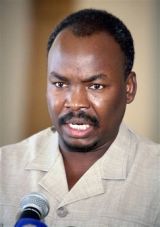ICC names first war crimes suspects in Darfur
Feb 27, 2007 (THE HAGUE) — Prosecutors for the International Criminal Court on Tuesday named a former Sudan state interior minister and a militia commander as the first suspects it wants tried for war crimes in Darfur.
 Chief prosecutor Luis Moreno-Ocampo asked pre-trial judges to issue summonses for Ahmed Haroun, state interior minister during the height of the Darfur conflict, and militia commander Ali Mohamed Ali Abdelrahman, also known as Ali Kushayb.
Chief prosecutor Luis Moreno-Ocampo asked pre-trial judges to issue summonses for Ahmed Haroun, state interior minister during the height of the Darfur conflict, and militia commander Ali Mohamed Ali Abdelrahman, also known as Ali Kushayb.
Haroun is currently Sudan’s state humanitarian affairs minister, a post below the full ministerial level. Ali Kushayb was a commander of the Janjaweed militia, who prosecutors said led attacks on towns and villages, where dozens were killed.
In a 94-page filing, prosecutors said there were reasonable grounds to believe the two bear criminal responsibility in relation to 51 counts of alleged crimes against humanity and war crimes committed against civilians in Darfur in 2003 and 2004.
Experts say some 200,000 people have been killed and 2.5 million others driven from their homes in Darfur since 2003, when rebels took up arms against the government, charging it with neglect. Khartoum says about 9,000 people have died.
Sudan denied the ICC had any right to try the suspects. “The court has no jurisdiction to try any Sudanese for any alleged crimes,” Justice Minister Mohamed Ali al-Mardi told a news conference in Khartoum.
A rights group said it was pleased by the court action.
“The figures identified are important ones. It is an important first step that could contribute to ending impunity for crimes in Darfur. But we want to see more,” said Geraldine Mattioli of Human Rights Watch. “The prosecutor should go high up in the echelons of power and in the military.”
LEGAL RESPONSIBILITY
U.N. and African Union observers blame pro-government Janjaweed militias for the worst atrocities in Darfur. The Sudanese government has denied arming the Janjaweed, who it describes as outlaws.
ICC prosecutors said security committees in Darfur made up of representatives of the Sudanese army, police and intelligence agencies reported to Haroun, especially on matters relating to the staffing, funding and arming of the Janjaweed.
“Haroun knowingly contributed to the commission of crimes against humanity and war crimes, including murder, rape, torture, inhumane acts, pillaging and the forcible transfer of civilian populations,” prosecutors said in the filing.
The prosecutors said Ali Kushayb, a colonel in the Wadi Salih locality of west Darfur, ordered the Janjaweed to victimise civilians and commit mass rape, killings, torture, pillaging and looting.
They said Khartoum had a legal responsibility to cooperate to make sure the two suspects appear at the court.
“It will be primarily the responsibility of the territorial state, the Sudan, upon the chamber’s decision, either to take steps to arrest the persons … or to serve the summons,” they said.
Haroun’s office said he was in Jordan this week for medical treatment but it was unclear if he was still in that country on Tuesday.
Sudan’s justice minister said Ali Kushayb had been in Sudanese custody since November on suspicion of violating Sudanese laws and was under investigation for actions in Darfur.
Sudanese media reported on Monday Khartoum would put several people on trial, including military personnel and paramilitary troops, for suspected involvement in attacks in Darfur.
The ICC is only supposed to prosecute when national courts are unwilling or unable to act, but rights groups say Khartoum’s own investigations in Darfur have been largely for show.
The prosecution said they had taken into account investigations launched by Sudanese authorities into Darfur, including into Ali Kushayb, but said their case was still admissible because it encompassed more extensive allegations.
The U.N. Security Council asked the ICC in March 2005 to launch an investigation into the violence in Darfur, which the United States has called genocide, a charge Khartoum denies.
Some analysts suggest Khartoum has resisted pressure to authorise a deployment of thousands of U.N. peacekeepers to support a 7,000-strong African Union mission in Darfur because it fears U.N. soldiers might be used to arrest ICC suspects.
The ICC, the world’s first permanent war crimes court, started work in 2002 and is now supported by 104 nations, although still not by Russia, China and the United States.
(Reuters)
